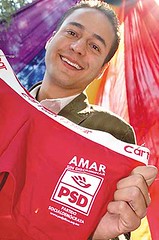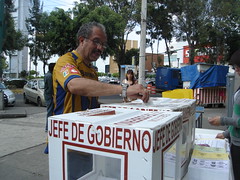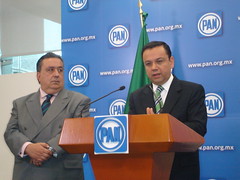
Gay mayoral hope wants to reveal and repair rifts in city
BY DAVID AGREN
The News
GUADALAJARA - Nomination battles within the nation's small parties seldom generate much excitement. But Miguel Galán has defied that trend by vying for a spot on the mayoral ballot as an openly gay candidate in Guadalajara, Jalisco, one of the country's most conservative cities.
Perhaps unsurprisingly, the 31-year-old's bid to take the mayor's office in a city known for its conservative Catholic politics has captured the attention of national newspapers and foreign media outlets. He is, after all, trying to become the first openly gay mayor in the country's history. But Galán insists his aspirations to govern Mexico's second-largest city go beyond championing issues important to the gay community.
"I'm not going to govern for just the gay community," Galán said while breaking from his campaign for the Social Democratic Party, or PSD, nomination in Guadalajara last weekend. "But I'm not going to forget it."
Mexican electoral campaigns traditionally have overlooked the gay community, which itself is said to be disparate in its partisan leanings and shy about venturing into the political arena. And few politicians or parties outside of Mexico City court the gay vote, or take up issues specific to the gay populace.
Galán recognizes the long odds. The conservative National Action Party, or PAN, has governed Guadalajara and Jalisco for the past 14 years and the Catholic Church wields enormous social influence there.
Galán, who was named the PSD candidate on Friday, will represent a party that only recently emerged from massive internal strife on the national level and is engaged in a struggle to pass the minimum-vote threshold in the July 5 elections that is necessary to maintain its registration with electoral authorities.
Galán's strategy, he says, will be to capitalize on the softening social attitudes in Guadalajara, which for all of its fame as a bastion of Catholic and conservative attitudes, is also home to a sizable gay community and many members of other religious sects. And Galán insists that Guadalajara as a whole is moving beyond many of its old stereotypes.
"Of course, we have this reputation, but in a city like Guadalajara . with more than 5 million people [in the metropolitan area], we can't say any longer that it's a conservative city," Galán said over iced tea and cigarettes on the patio of a popular café in the Colonia Americana, a leafy neighborhood where the gay community has a noticeable presence.
"It's a city that in many ways is cosmopolitan. There's every type of thinking, there's every kind of ideology - and liberals are continually gaining ground."
Galán confesses to bringing little political experience to his mayoral bid - he only joined the PSD within the past two months - but he does bring idealism and a background of fighting for social causes.
Originally trained as a helicopter pilot, he said that he wanted to use his skills to save dolphins from the nets of tuna fishermen, but became sidetracked with other projects.
Those projects included the founding of an Internet radio station for the gay community and later a gay-focused program on the University of Guadalajara's radio station. Galán also worked in the culture department of the municipal government - which now sponsors ancillary events at the city's annual gay pride parade - and was involved in launching a newspaper on women's issues.
Galán says that his "red socialist blood" came from his grandfather, who fought on the Republican side of the Spanish Civil War. He cites Spanish President José Luis Zapatero as a political hero on account of his liberalization agenda, which included a gay marriage initiative that passed.
Galán's interest in politics only grew stronger after the 2006 campaign of Patricia Mercado, who successfully courted the gay vote for Alternativa, as the PSD was previously known.
Like Mercado - who renounced her PSD membership last fall - Galán speaks more of issues like minority rights and equality than bread-and-butter municipal political issues like roads and sewers.
And in Guadalajara, he sees inequality in many places, including the way that more municipal money is spent on the wealthier west side of the city - where he resides in a neighborhood known for rosebushes lining the streets - than the working-class east side.
"If you go to the east side . you won't find one park in [good conditions] of security, cleanliness, and upkeep," he said. Even worse, he said, for every 12 trees on the west side, there's only one in eastern Guadalajara. On the east side of the divide, pollution from cement plants, winter bonfires and brick ovens produces air quality levels worse than those in Mexico City.
"If we all pay the same taxes, we should get exactly the same services," he said.
If elected, he promises to "review . and eliminate all discriminatory laws," and open City Hall for dialogue between groups that seldom come together - or even venture across the Calzada de la Independencia, a roadway that slices the city in two.
"At this moment, the rich fear the poor and vice versa, the poor fear the rich," Galán said. "No one is communicating with each other."
IS GUADALAJARA READY?
How Galán's message of tolerance and dialogue will be received is uncertain. Equally uncertain is if Guadalajara is ready for a gay mayor.
Activists in the gay community and political observers express differing opinions over the matter.
"The image people have of Jalisco is somewhat incorrect," said political science professor Joaquín Galindo Díaz of the University of Guadalajara, who agrees that changing social values work in the favor of Galán's candidacy. "Half of the population is conservative, but the other half, no."
That other half includes a gay community whose presence is visible and whose reputation is well-known outside western Mexico.
A 2003 survey in the local newspaper Mural found more gay-oriented businesses in Jalisco - split equally between Guadalajara and Puerto Vallarta, a long-time destination for gay tourists - than any other jurisdiction in the country.
And just last year, a 90 million peso donation by the Jalisco government toward the construction of a massive Catholic temple in the Guadalajara suburb of Tlaquepaque generated a record number of human rights complaints and spurred so many streets protests that the money was returned.
Others speak less enthusiastically about social change in Guadalajara, however. Aarón Díaz, who works with a health organization that runs a monthly HIV-testing clinic, said that the city is only marginally more tolerant than it was two decades ago. Back then, a conference that was set to be held by an international gay organization was hounded out of town, and the office of one gay advocacy group was even attacked with Molotov cocktails.
"Guadalajara has a reputation for double standards," Díaz said, adding, "the gay community itself is very conservative."
Díaz doesn't think the city is ready for a gay mayor. Others concur.
"This city is very Catholic . [and] not ready for a candidate like that" said Lili Ceja, who has been promoting PAN mayoral candidate Jorge Salinas in Guadalajara.
Still, at least some average citizens seem willing to take a chance on a candidate like Galán.
"Maybe he would be a little less worse than the other [politicians]," said taco stand waiter Mario Becerra.
 'Mexico no failed state'
'Mexico no failed state' 




